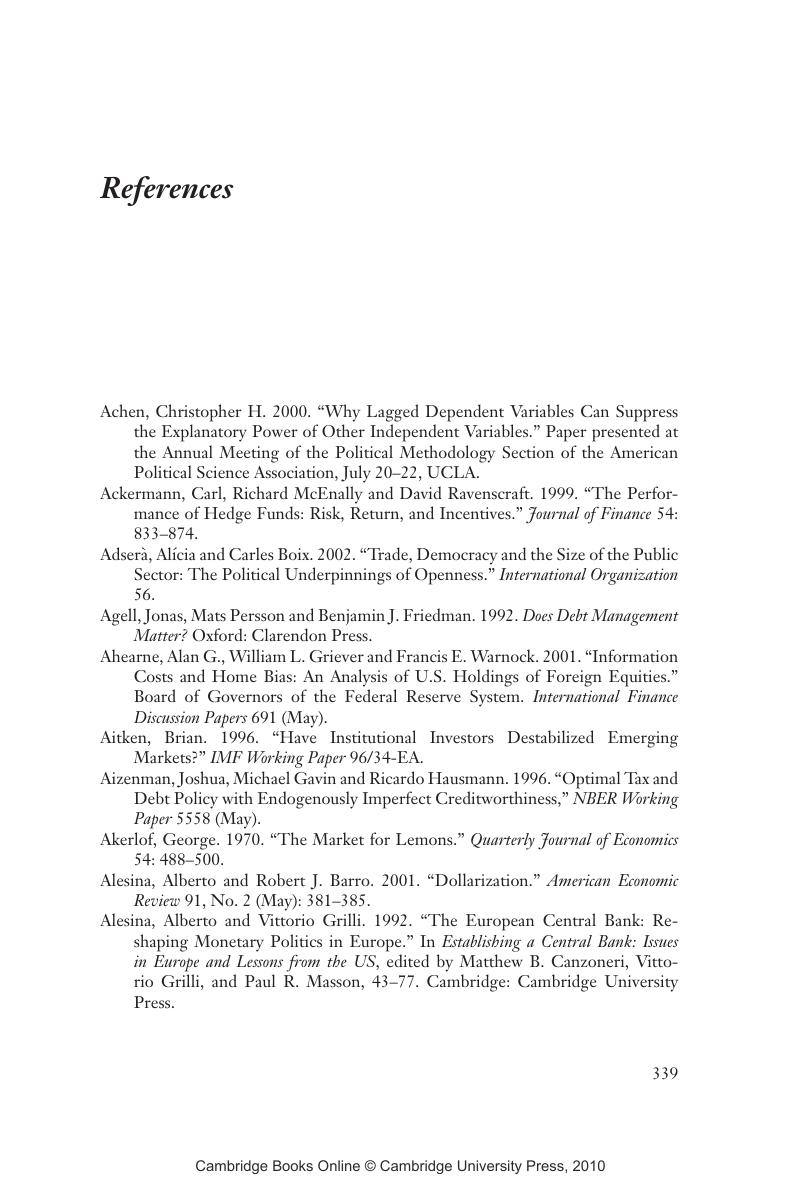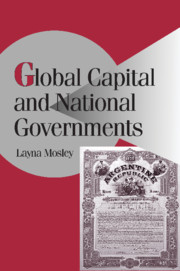Book contents
- Frontmatter
- Contents
- List of Figures and Tables
- Acknowledgments
- 1 NATIONAL GOVERNMENTS AND GLOBAL CAPITAL: A RECASTING
- 2 FINANCIAL MARKET INFLUENCE ON GOVERNMENT POLICY: THEORY AND HYPOTHESES
- 3 FINANCIAL MARKET INFLUENCE IN DEVELOPED NATIONS: AN EMPIRICAL ASSESSMENT
- 4 FINANCIAL MARKET–GOVERNMENT RELATIONS IN EMERGING MARKETS
- 5 POLITICS MEETS MARKETS: DOMESTIC RESPONSES TO FINANCIAL MARKET PRESSURES
- 6 ALTERNATIVE DOMESTIC RESPONSES: CHANGES TO FINANCIAL MARKET–GOVERNMENT RELATIONS
- 7 HISTORY REPEATING ITSELF? FINANCIAL MARKETS AND NATIONAL GOVERNMENT POLICIES BEFORE THE FIRST WORLD WAR
- 8 FINANCIAL MARKET–GOVERNMENT RELATIONS IN THE TWENTY-FIRST CENTURY
- APPENDIX 2.1 FINANCIAL MARKET INTERVIEWS
- APPENDIX 3.1 DATA DEFINITIONS AND SOURCES
- APPENDIX 3.2 FULL RESULTS FOR MACROINDICATORS MODEL
- APPENDIX 4.1 THE COMPONENTS OF THE SDDS
- APPENDIX 4.2 RATING AGENCY METHODOLOGIES
- APPENDIX 4.3 RATING AGENCY OUTCOMES, 1997
- APPENDIX 6.1 NATIONS IN CAPITAL CONTROLS DATA SET
- References
- Index
- Titles in the series
- References
References
Published online by Cambridge University Press: 14 January 2010
- Frontmatter
- Contents
- List of Figures and Tables
- Acknowledgments
- 1 NATIONAL GOVERNMENTS AND GLOBAL CAPITAL: A RECASTING
- 2 FINANCIAL MARKET INFLUENCE ON GOVERNMENT POLICY: THEORY AND HYPOTHESES
- 3 FINANCIAL MARKET INFLUENCE IN DEVELOPED NATIONS: AN EMPIRICAL ASSESSMENT
- 4 FINANCIAL MARKET–GOVERNMENT RELATIONS IN EMERGING MARKETS
- 5 POLITICS MEETS MARKETS: DOMESTIC RESPONSES TO FINANCIAL MARKET PRESSURES
- 6 ALTERNATIVE DOMESTIC RESPONSES: CHANGES TO FINANCIAL MARKET–GOVERNMENT RELATIONS
- 7 HISTORY REPEATING ITSELF? FINANCIAL MARKETS AND NATIONAL GOVERNMENT POLICIES BEFORE THE FIRST WORLD WAR
- 8 FINANCIAL MARKET–GOVERNMENT RELATIONS IN THE TWENTY-FIRST CENTURY
- APPENDIX 2.1 FINANCIAL MARKET INTERVIEWS
- APPENDIX 3.1 DATA DEFINITIONS AND SOURCES
- APPENDIX 3.2 FULL RESULTS FOR MACROINDICATORS MODEL
- APPENDIX 4.1 THE COMPONENTS OF THE SDDS
- APPENDIX 4.2 RATING AGENCY METHODOLOGIES
- APPENDIX 4.3 RATING AGENCY OUTCOMES, 1997
- APPENDIX 6.1 NATIONS IN CAPITAL CONTROLS DATA SET
- References
- Index
- Titles in the series
- References
Summary

Information
- Type
- Chapter
- Information
- Global Capital and National Governments , pp. 339 - 372Publisher: Cambridge University PressPrint publication year: 2003
